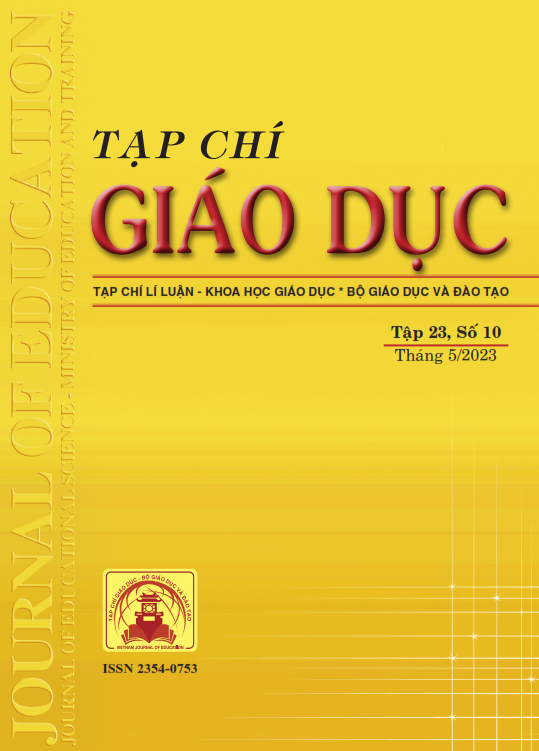Thái độ và kì vọng của sinh viên sư phạm tiếng Anh đối với ChatGPT: nghiên cứu tại Trường Đại học Sư phạm Hà Nội
Tóm tắt
ChatGPT is an artificial intelligence tool with potential applications in foreign language learning to support the current learning as well as the teaching career of future teachers. The study used convergent mixed-methods design, collected data through surveys and interviews with English pedagogical students at Hanoi National University of Education in order to assess the familiarity and application of ChatGPT as well as the attitude of EFL pre-service teachers towards its potential to support future learning and teaching. The results showed that most of the students participating in the study had heard of ChatGPT and some used it for learning purposes. The participants showed a positive attitude towards ChatGPT’s ability to support learning, giving examples of its ability to provide quick and accurate answers and its potential to improve language skills. However, they also expressed concerns about the reliability and accuracy of the information provided by ChatGPT and the negative effects on critical thinking skills. The study leads to suggestions for the integration of ChatGPT and other artificial intelligence tools in English language teaching and proposes further research to explore its effectiveness and related ethical issues.
Tài liệu tham khảo
Akgun, S., & Greenhow, C. (2022). Artificial intelligence in education: Addressing ethical challenges in K-12 settings. AI and Ethics, 2, 431-440. https://doi.org/10.1007/s43681-021-00096-7
Ali, J. K. M., Shamsan, M. A. A., Hezam, T. A., & Mohammed, A. A. (2023). Impact of ChatGPT on Learning Motivation: Teachers and Students’ Voices. Journal of English Studies in Arabia Felix, 2(1), 41-49. https://doi.org/10.56540/jesaf.v2i1.51
Braun, V., & Clarke, V. (2019). Reflecting on reflexive thematic analysis. Qualitative Research in Sport, Exercise and Health, 11(4), 589-597. https://doi.org/10.1080/2159676X.2019.1628806
Bryman, A. (2016). Social research methods (5th ed.). Oxford University Press.
Chiu, T. K., Moorhouse, B. L., Chai, C. S., & Ismailov, M. (2023). Teacher support and student motivation to learn with Artificial Intelligence (AI) based chatbot. Interactive Learning Environments, 1-17. https://doi.org/10.1080/10494820.2023.2172044
Creswell, J. W., & Guetterman, T. C. (2019). Educational research: Planning, conducting, and evaluating quantitative and qualitative research (6th ed.). Pearson.
Han, S., Liu, M., Pan, Z., Cai, Y., & Shao, P. (2022). Making FAQ chatbots more inclusive: an examination of non-native English users’ interactions with new technology in massive open online courses. International Journal of Artificial Intelligence in Education, 1-29. https://doi.org/10.1007/s40593-022-00311-4
Huang, X., Zou, D., Cheng, G., Chen, X., & Xie, H. (2023). Trends, Research Issues and Applications of Artificial Intelligence in Language Education. Educational Technology & Society, 26(1), 112-131. https://doi.org/10.30191/ETS.202301_26(1).0009
Jeon, J. (2021). Exploring AI chatbot affordances in the EFL classroom: Young learners’ experiences and perspectives. Computer Assisted Language Learning, 1-26. https://doi.org/10.1080/09588221.2021.2021241
Kasneci, E., Sessler, K., Küchemann, S., Bannert, M., Dementieva, D., Fischer, F., Gasser, U., Groh, G., Günnemann, S., Hüllermeier, E., Krusche, S., Kutyniok, G., Michaeli, T., Nerdel, C., Pfeffer, J., Poquet, O., Sailer, M., Schmidt, A., Seidel, T., & Kasneci, G. (2023). ChatGPT for good? On opportunities and challenges of large language models for education. Learning and Individual Differences, 103, 102274. https://doi.org/10.1016/j.lindif.2023.102274
Kuleto, V., Ilić, M., Dumangiu, M., Ranković, M., Martins, O. M., Păun, D., & Mihoreanu, L. (2021). Exploring opportunities and challenges of artificial intelligence and machine learning in higher education institutions. Sustainability, 13(18), 10424. https://doi.org/10.3390/su131810424
Liang, J.-C., Hwang, G.-J., Chen, M.-R. A., & Darmawansah, D. (2021). Roles and research foci of artificial intelligence in language education: an integrated bibliographic analysis and systematic review approach. Interactive Learning Environments, 1-27. https://doi.org/10.1080/10494820.2021.1958348
Liu, C., Hou, J., Tu, Y.-F., Wang, Y., & Hwang, G.-J. (2021). Incorporating a reflective thinking promoting mechanism into artificial intelligence-supported English writing environments. Interactive Learning Environments, 1-19. https://doi.org/10.1080/10494820.2021.2012812
Ma, L. (2021). An immersive context teaching method for college English based on artificial intelligence and machine learning in virtual reality technology. Mobile Information Systems, 2021, 1-7. https://doi.org/10.1155/2021/2637439
Ouyang, F., Zheng, L., & Jiao, P. (2022). Artificial intelligence in online higher education: A systematic review of empirical research from 2011 to 2020. Education and Information Technologies, 27(6), 7893-7925. https://doi.org/10.1007/s10639-022-10925-9
Roll, I., & Wylie, R. (2016). Evolution and revolution in artificial intelligence in education. International Journal of Artificial Intelligence in Education, 26, 582-599. https://doi.org/10.1007/s40593-016-0110-3
Tlili, A., Shehata, B., Adarkwah, M. A., Bozkurt, A., Hickey, D. T., Huang, R., & Agyemang, B. (2023). What if the devil is my guardian angel: ChatGPT as a case study of using chatbots in education. Smart Learning Environments, 10(1), 15. https://doi.org/10.1186/s40561-023-00237-x
Tải xuống
Đã Xuất bản
Cách trích dẫn
Số
Chuyên mục
Giấy phép

Tác phẩm này được cấp phép theo Ghi nhận tác giả của Creative Commons Giấy phép quốc tế 4.0 .












